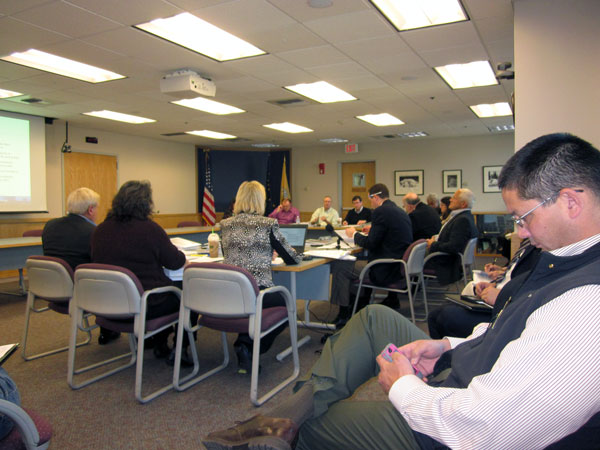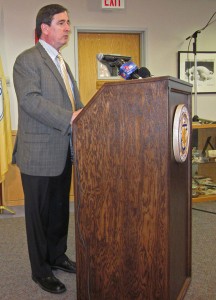
Friday, Anchorage Municipal leaders met at city hall to go over the proposed 2013 budget. The Mayor’s chief financial officer announced amendments to Proposed Budget ‘B,’ small changes that could make a big difference to the fire department.
Assembly members spent the morning sitting in a semi circle on the eighth floor of city hall staring at a power point presentation on a screen. There were a lot of numbers, making up two versions of the 2013 budget proposed by Mayor Dan Sullivan. Chief Financial officer, Lucinda Mahoney noted that the mayor and the fire chief have been in talks about how to avoid shutting stations down.
“The administration has been working very hard with our fire chief to come up with a plan that allows all of our fire stations to remain open,” Mahoney said.

Earlier this month, the Mayor proposed two budgets. Proposed Budget A cut a ton of services and positions plus shut down several fire stations – the Mayor himself does not favor it. His Proposed B Budget avoids most of the cuts by using some of 13 million newly available tax dollars usually used by the school district. Mahoney introduced some surprise modifications to the budget favored by the Mayor, “Plan B.”
“Instead of closing stations in Plan B, what we’ll do is just take certain apparatus out of service such that all of our stations stay open and only these two pieces of apparatus are impacted. And what they are is Tender 9 and Truck 11,” Mahoney said.
Tender 9, basically a giant water truck, in Southport and Truck 11 in Eagle River were selected for elimination, Mahoney says, because of their low run numbers. In the original Proposed Budget B, one station, Station 15 in South Port, would have been closed. The amendments to Plan B keep that station open. Rod Harris with the Anchorage Firefighter’s Union says he’s happy to see Station 15 off the chopping block but he still has concerns about the impact of shutting down Tender 9 and Truck 11. The Tender which serves the Hillside is critical to that neighborhood because it does not have many hydrants, he says. And eliminating Truck 11 in Eagle River, Harris says, is troubling for several reasons.
“It provides all the extrication equipment. If we have a vehicle accident on the highway with entrapment where we need to cut a vehicle apart. It provides the personnel and some equipment that is used for the swift water rescues that take place in Eagle River. And then lastly, there’s a mutual aid agreement between the Anchorage Fire Department and the Chugiak Volunteer Fire Department. The Chugiak volunteers don’t have a ladder truck. And so when they get a structure fire, they always have Truck 11 on the initial dispatch,” Harris said.
Assembly member Debbie Ossiander, who represents Chugiak/Eagle River said she was worried that cutting Truck 11 would mean calling in help from Wasilla which could result in lengthy response times. Mayor Sullivan’s budget proposals aim to eliminate a $30 million budget shortfall. The assembly will discuss the budget during a regular meeting Oct. 23, where there will be an opportunity for public comment. The assembly plans to pass a finalized budget at their regular meeting Nov. 13.
Daysha Eaton is a contributor with the Alaska Public Radio Network.
Daysha Eaton holds a B.A. from Evergreen State College, and a M.A. from the University of Southern California. Daysha got her start in radio at Seattle public radio stations, KPLU and KUOW. Before coming to KBBI, she was the News Director at KYUK in Bethel. She has also worked as the Southcentral Reporter for KSKA in Anchorage.
Daysha's work has appeared on NPR's "Morning Edition" and "All Things Considered", PRI's "The World" and "National Native News". She's happy to take assignments, and to get news tips, which are best sent via email.
Daysha became a journalist because she believes in the power of storytelling. Stories connect us and they help us make sense of our world. They shed light on injustice and they comfort us in troubled times. She got into public broadcasting because it seems to fulfill the intention of the 4th Estate and to most effectively apply the freedom of the press granted to us through the Constitution. She feels that public radio has a special way of moving people emotionally through sound, taking them to remote places, introducing them to people they would not otherwise meet and compelling them to think about issues they might ordinarily overlook.




